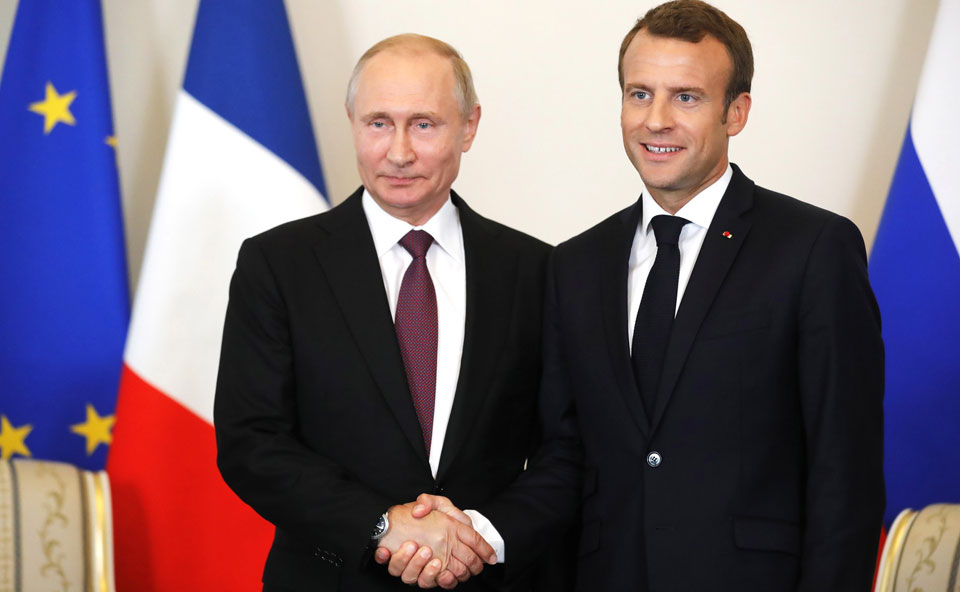
PARIS — With Joe Biden calling for regime change on Russia’s border, with arms pouring into the country, and with charges against the Russians of “genocide,” the war in Ukraine—which those fanning the flames, most prominently the American media, seem to want to go on indefinitely—is having a devastating impact on all of Europe and particularly in France, where it is possible that war could help bring the far right to power in the presidential elections.
Emmanuel Macron has spent the campaign appearing to be above the fray, unwilling to debate the other candidates and simply presenting himself as, in the American parlance “presidential,” in the French “kingly”—the captain of the ship, the only one able to steer a course for France and Europe through the tempest of the war in Ukraine and its destabilization of the European economy.
The argument, though, is beginning to fall apart as the two candidates who have most strictly hammered home the effects of the war on France’s working people, Jean-Luc Mélenchon and Marine Le Pen, have gained in the polls approaching Sunday’s election with Le Pen also gaining in a predicted second round against Macron. Le Pen has infused her sentiment for ordinary French with an unhealthy dose of anti-immigrant rhetoric.
The most prominent immediate effect of the war has been an increase in an already rising inflation after French businesses raised prices coming out of the COVID confinement. Oil and natural gas prices have soared without Russian exports, as has the price of wheat, the ingredient in that staple of the French diet, bread, since Russia and Ukraine produce one-third of all the world’s wheat. The increased cost of transport, due to rising costs of fuel, has had a crushing effect as well not only on food but on the price of all commodities.
A lack of Russian raw materials also affects the metal and steel industry with a particular impact on manufacturing automobiles, as well as paper and boxes, to the point where l’Humanité estimates the war will cost each French household 550 euros this year. The war will also impact French investment since the country is the leading foreign employer, and second in overall investment, in Russia. Meanwhile, Russia otherwise does not figure prominently in the financial industries, with only 1.5% of all transactions based in that country. Thus, for wealthy speculators, a group Macron, often called “the president of the rich,” represents, the war is less of a burden.
The war has wider and deadlier effects which ripple through French society. In agriculture, for example, there is a campaign to abolish polluting pesticides such as glyphosate which are contributing to an uptake of cancer in infants over the last 20 years. Macron had announced at the beginning of his five-year term in 2017 that he would ban that substance by 2021. Instead, the use has increased, and in a recent speech, he called for French farmers to “produce more,” without mentioning the pesticide problem, a call that was taken as shelving of the issue. In addition, the French may have shot themselves in the foot by blocking the assets of Russian businessman Andrey Melnichenko of the Suisse group Eurochem, the global leader in the fertilizer necessary to “produce more.”
Meanwhile, the society itself is suffering from Macron’s war on the French social model, which has included austerity for local governments and promotion of private enterprise as France becomes, in his phrase, a “start-up nation.” A crashing failure in this area is nursing homes where the private company Orpea, the European leader in private care, had been accused of a deadly cutting of corners in reducing personnel and care to increase profits. The scandal emerged from Professor Victor Castanet’s research published in a book titled The Gravediggers. Charges have recently been filed against the company for endangering the lives of patients, general neglect, and “involuntary homicide” through such actions as patients dehydrating because they are not made to drink regularly. Needless to say, this window into the “wonders” of private enterprise goes against Macron’s ethos, and his minister has suppressed a state report on the scandal because it would reveal “business secrets,” among them presumably how greedy the company became at the expense of those it was supposed to serve.
Macron himself has for most of the campaign not only tilted toward but also outright copied the program of the right. He promises to return 7.5 billion euros to business, partially financed by a cut of 10 billion to local governments which have been the victim of austerity budgets. He has also “pledged” to raise the retirement age from 62 to 65, harden conditions for granting immigrants asylum, and, in a page torn from Bill Clinton’s neoliberal regime in the 1990s, require those on unemployment to work 15 to 20 hours a week to qualify. Meanwhile, not a word in his campaign about a major issue in France, tax fraud.
The “presidential” candidate had no riposte to the two candidates nipping at his heels who continue to hammer home the deteriorating condition of ordinary French workers except to call out Le Pen for her cozying up to Putin. Last week 2000 artists, intellectuals, and cultural workers, in an editorial in Le Monde, attempted to pull the always divided left together by calling for a vote for Mélenchon, who they argued remains the candidate most focused on the struggles of working people, untainted by Le Pen’s far-right blaming of immigrants for the country’s problems. However, Macron’s ignoring of the actual conditions in France, worsened by a war he has not done enough to stop, though he has attempted to resume talks, threatens to bring the disaster of a far-right victory ever closer.












Comments